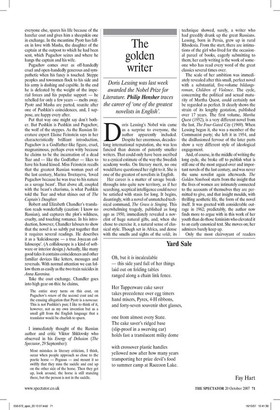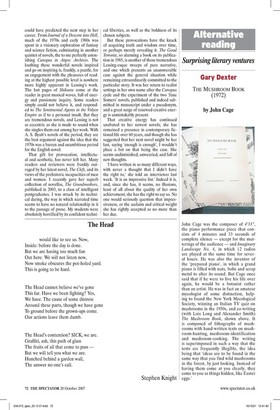The golden writer
Doris Lessing was last week awarded the Nobel Prize for Literature. Philip Hensher traces the career of 'one of the greatest novelists in English'.
Doris Lessing's Nobel win came as a surprise to everyone, the author apparently included. Despite her enormous, decadeslong international reputation, she was less fancied than dozens of patently smaller writers. That could only have been ascribed to a cynical estimate of the way the Swedish academy works. On literary merit, no one would have questioned her right to it. She is one of the greatest of novelists in English.
Her career is a matter of savage breakthroughs into quite new territory, as if her searching, sceptical intelligence could never be satisfied with stasis for long. It begins, dauntingly, with a novel of unmatched technical command, The Grass is Singing. This overwhelming tragedy, published as long ago as 1950, immediately revealed a novelist of huge natural gifts, and, when she chose to exercise it, a natural sense of classical style. Though set in Africa, and dense with the smells and sights of the veldt, its technique showed, surely, a writer who had greedily drunk up the great Russians. Lessing, born in Persia, grew up in rural Rhodesia. From the start, there are intimations of the girl who lived for the occasional parcel of books, eagerly submitting to them; her early writing is the work of someone who has read every word of the great classics several times over.
The scale of her ambition was immediately revealed after this small, perfect novel with a substantial, five-volume bildungsroman, Children of Violence. The cycle, concerning the political and sexual maturity of Martha Quest, could certainly not be regarded as perfect. It clearly shows the strain of its lengthy gestation, published over 17 years. The first volume, Martha Quest (1952), is a very different novel from the last, The Four-Gated City (1969). When Lessing began it, she was a member of the Communist party; she left it in 1954, and the disillusioned fervour of the later parts show a very different style of ideological engagement.
And, of course, in the middle of writing the long cycle, she broke off to publish what is still one of the most argued-over and important novels of the last century, and was never the same novelist again afterwards. The Golden Notebook starts from the insight that the lives of women are intimately connected to the accounts of themselves they are permitted to give, and that insight moulds, with thrilling aesthetic life, the form of the novel itself. It was greeted with considerable outrage in 1962; predictably, the author now finds more to argue with in this work of her youth than do those feminists who elevated it to an early canonical text. She moves on; her admirers barely keep up.
Only the most clairvoyant of readers could have predicted the next step in her career. From Journal of a Descent into Hell, much of the 1970s and early 1980s was spent in a visionary exploration of fantasy and science fiction, culminating in another quintet of novels, the to me perfectly astonishing Canopus in Argos: Archives. The loathing these wonderful novels inspired and go on inspiring is, frankly, a puzzle, for an engagement with the pleasures of reading at the highest possible level is nowhere more highly apparent in Lessing's work. The last pages of Shikasta come at the reader in great musical waves, full of energy and passionate inquiry. Some readers simply could not believe it, and responded to The Sentimental Agents in the Volyen Empire as if to a personal insult. But they are tremendous novels, and Lessing is not as eccentric as she is made to sound when she singles them out among her work. With A. S. Byatt's novels of the period, they are the best argument against the idea that the 1970s was a barren and unambitious period for the English novel.
That gift for provocation, intellectual and aesthetic, has never left her. Many readers and reviewers were frankly outraged by her latest novel, The Cleft, and its views of the prehistoric incapacities of men and women. I recently gave her superb collection of novellas, The Grandmothers, published in 2003, to a class of intelligent postgraduates. I was struck by its technical daring, the way in which narrated time seems to have no natural relationship in it to the passage of prose. My students were absolutely horrified by its confident technical liberties, as well as the boldness of its chosen subjects.
But these provocations have the knack of acquiring truth and wisdom over time, or perhaps merely revealing it. The Good Terrorist, so alarming a book on its publication in 1985, is another of those tremendous Lessing-esque sweeps of pure narrative, and one which presents an unanswerable case against the general situation while remaining extraordinarily committed to the particular story. It was her return to realist settings in her own name after the Canopus cycle and the experiment of the two 'Jane Somers' novels, published and indeed submitted in manuscript under a pseudonym, and a great surge of renewed creative energy is unmistakably present.
That creative energy has continued unabated to her newest novels; she has remained a presence in contemporary fictional life over 60 years, and though she has suggested that her next novel might be her last, saying 'enough is enough', I wouldn't place a bet on that being the case. She seems undiminished, unwearied, and full of new thoughts.
'I have written in so many different ways, with never a thought that I didn't have the right to,' she told an interviewer last week. 'It is an impressive list.' Indeed it is, and, since she has, it seems, no illusions, least of all about the quality of her own achievement, she has the right to say so. No one would seriously question that impressiveness, or the acclaim and critical weight she has rightly accepted as no more than her due.








































































 Previous page
Previous page